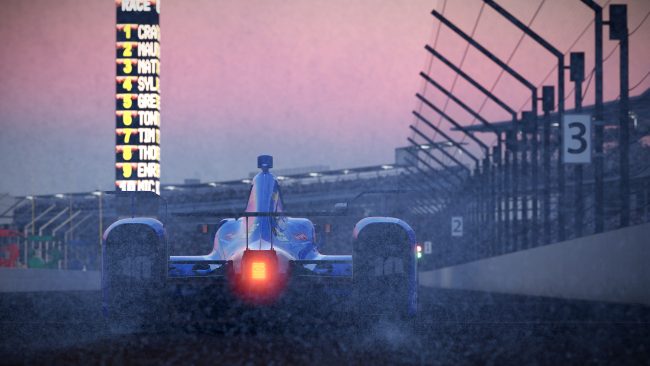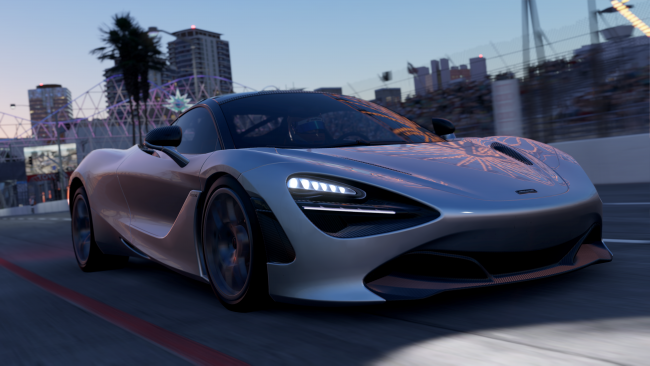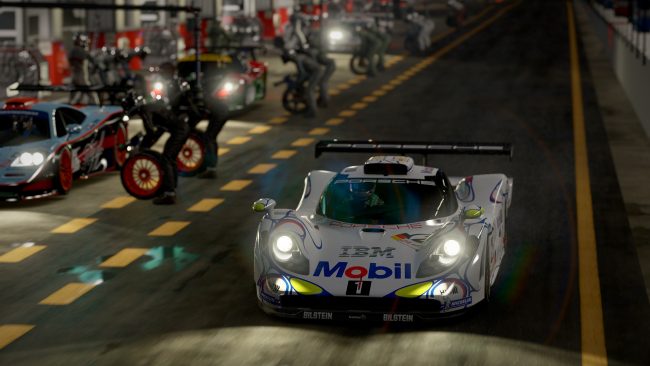
Passed down through the generations of Western culture is the sentiment that the wheels on the bus go round and round. I wish to challenge this notion. Such a tight focus on the wheels, their form plainly toroidal, diminishes the value of the real hero here: the bus driver. The bus driver man, he who we should be celebrating through ritualistic chants on pilgrimages to the zoo, is the very man for whom Project Cars 2 has been made. With improvements from its predecessor in almost every respect, PC2 is not a game for wheels or shanty-singing-kiddlywinks. Project Cars 2 is a game for drivers.
While the poor bus driver man works in what amounts to an apartment with wheels, Project Cars 2 gives him the chance to race like a pro. Everything in the game is in the context of professional racing, and it does a damn good job of simulating the atmosphere of the track. Your engineer will advise you throughout the race, there’ll be crowds of racegoers on the sidelines and breaking the rules is tantamount to a death sentence. Cultivating a feel of the track is one thing, but feeling the track is another.

Whether you play on a wheel or controller (though if you use the latter, you should seek help), the game will feel pretty true to life – but not perfect. On a controller, the cars handle like driving a car with a controller. Acceleration and braking need to be managed a bit more than in an arcade game like Forza Horizons, and you won’t be getting much in the way of feedback beyond visuals. The wheel will react to perturbations in the road and marbles on the track, though it loses all reactivity in less extreme areas. Minor bumps on the road don’t create any noticeable feedback either, so while it’s a step up from Project Cars 1, it’s still not up there with the likes of iRacing or Assetto Corsa. The simulation isn’t terrible, it’s just not the best out there, and it’s a far better game than the alternatives.
Project Cars 1 was a middle ground between a game and hardcore sim, and Project Cars 2 follows this same direction. While the sim isn’t the best, it’s competent enough to provide a strong backbone for the career mode. There’s plenty of directions for your career to take, ranging across karts, rally, GT and Formula One racing. You can even skip most of the lower-tiers of the races, though the top-tier stuff must be earned to partake in. Or, if you’re like me, you can disregard all the pompous affairs and make whatever custom race you want.

One of the great things about the game is that you have access to all the cars from the start, so you can make any race you want. If you want to race for 24 hours in snow on Bathurst, you can do that. Want to make a race involving Road D cars with GT ones? Go ahead! The game even has a save system associated with your custom races so you can bring it up again later. There are also nine pre-set racing sets that take care of the rules and opponents for you, so you don’t have to fool around getting the rules right if you want to race in something you already know about. The problem is that none of this helps out the poor nooblets git gud.
While the career mode offers a nice progression to follow, it doesn’t provide any support for someone who’s unfamiliar with motorsport. The humble bus driver man is probably very good at driving a bus, but racing an LMP car around a circuit is a different kettle of lubricants. Much like the first game, there are no tutorials, challenges or anything that can assist in acquiring the foundational skills of racing. Even the engineer assistant in the tuning setup relies on the player knowing whether the problem stems from suspension, downforce, braking or gearing, and trust me, noobsticles won’t know. For the experienced creed, these problems won’t exist, but it’s disheartening to see how hard it can be for someone new to the sport to get further in. They’ll still be able to appreciate the graphics, though.

Nothing beats a good looking car quite like a bunch of goons with a coin bag, and Project Cars 2 delivers visuals that would make anyone want to start up a piggy bank. Cars look bloody gorgeous in motion, and weather effects are almost flawlessly executed. There is the occasional hiccup, like when my windscreen wipers didn’t wipe away the rain, but it’s a good looking game. Some of the finer details from its predecessor seem to be missing, but I’m happy to give them up if it means we have a better UI.
To call the menus in Projects Cars 2 an improvement would be like saying self-driving cars are kind of cool. I went back and played PC1 to check if the menus were any better, and man, my eyes burned at the sight of whatever the hell the old menus were going for. Cars and tracks are now sortable in groups rather than one massive list, and the colours on the screen won’t burn your retinas to a crisp. The in-race UI has been improved too, with information like speed and rpm delivered in a more intuitive format than a box with some text in it. There’s still a few quirks, like sliders that adjust whole number values but don’t adjust immediately, but it’s a much, much better UI to search for your vehicle of choice with.

Speaking of cars, the name of the game would suggest there’s quite a few to play with. Shock horror, there are a lot of cars in the game, some in classes I didn’t even know existed. There’s just about double the number of cars in the game than the original (187 is a big number too), but they all follow the same racing theme. If you want to drive a road car, there are a few to choose from, but the focus is very much on cars for motorsport. With such a wide variety of cars in the lineup, it’d be a shame not to have plenty of tracks to drive them on.
Don’t worry; Project Cars 2 has got tracks in spades. Again, there are almost double the tracks than the original, and each of them is rendered in meticulous detail – more or less. As I mentioned before, minor perturbations don’t seem to have much effect on your vehicle, but there are some nifty tracks here. The Circuit de Spa-Francorchamps Historic is quite the beast, and being able to experience it in any weather condition I want is quite the pleasure. Lots of cars. Lots of tracks. Now we just need some excellent AI and we’ll be set!

…I’ve got good news and bad news about the AI. The good news is that the AI is dumber and more erratic than my university lab partner’s attitude on due dates. You might be thinking that this is bad news, and it is, so… Yup. The number of times I’ve had an AI buddy push into the back of me and caused me to spin out is ridiculous. I’ve even had them straight up ram into the back of me because they refuse to deviate from the racing line unless it involves a sharp 45-degree turn. All things are relative, though, and it’s nothing compared to the bad news.
The bad news is that the AI, much like my lab partner, seems to cheat. I was driving some karts around a little track, nothing too outlandish, and doing a poor job of leading the race. Now, the thing about karts is that they have a uniform top speed because there’s only one model in the game. The AI, however, found a way to overtake me on the straight by going faster than the max speed a kart can reach. Maybe my screaming engine was lying to me, maybe karts are just glitchy as hell, but it was resounding nonsense that ruined my enjoyment of the race. None of the other races I played had this problem, but that might also be because my driving skills resemble an elderly woman’s dedication to staying 30km/h below the speed limit.

It’s still not quite a perfect racing game, but Project Cars 2 is an improvement over its predecessor in almost every regard. More cars, more tracks and a much-needed improvement to the UI make the game a vastly better experience than the original. There are still some glaring issues that need to be sorted before it can be considered truly great, but for the most part, it’s a damn good racing sim. The real deal breaker here is that there are no buses for me to drive around LeMans. Sometimes I just want to be hailed, okay? Can’t be letting the bus driver man have all the fun.











